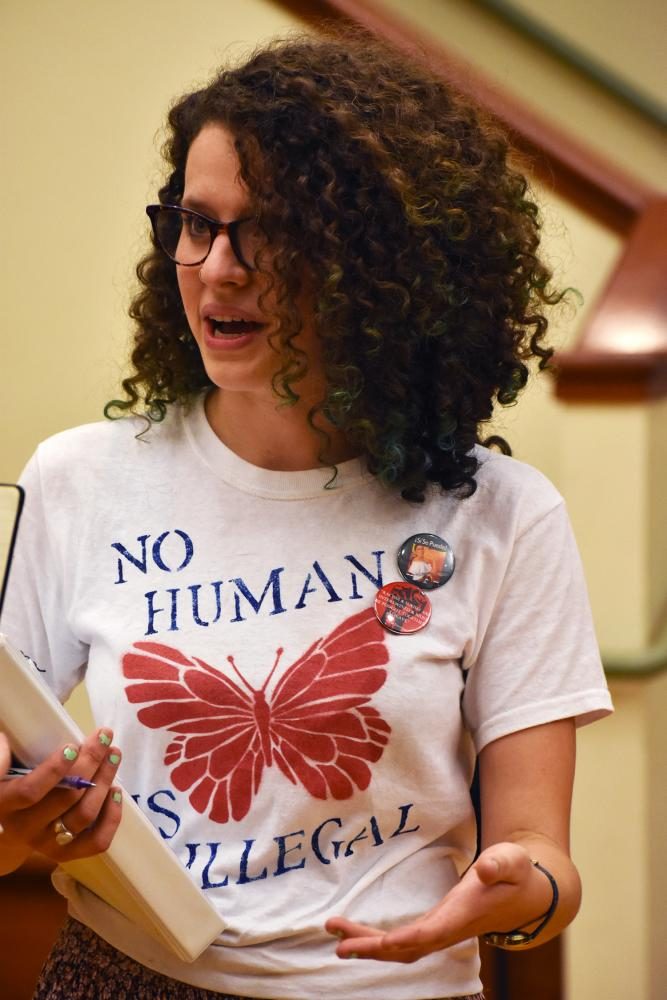Stand up for our peers, our DACA recipients
DACA recipients are among the best, but are put in a difficult situation
KEISHA BROKAW | Daily Evergreen File
University of Idaho law student Audrey Faunce urges attendees of the Sept. 5 Defend DACA Vigil to call their representatives.
September 19, 2017
Imagine getting deported to a country you know very little about, losing your college degree, your job, your whole family. Imagine losing everything you have worked for.
Nearly 800,000 recipients of Deferred Action for Childhood Arrivals (DACA) experience this fear every day, hour and minute.
“I feel betrayed by the society I grew up in,” one WSU student and DACA recipient said, “with the highest government officials taking away everything I have with a few signatures.”
Our peer, the WSU student and DACA recipient, came to the U.S. at the age of 4 with his family. He asked to remain anonymous out of concern for his safety now that the program will be terminated in six months.
DACA is a federal program that protects eligible immigrants from deportation because they came to the U.S. as children. DACA gives undocumented immigrants legal permits to work and live in the U.S. The program’s protections expire every two years and could be renewed by the recipients.
The White House announced the program will be terminated, leaving the destiny of almost 800,000 people in the U.S. undetermined if Congress does not replace the policy in six months. Many are successful and employed college students.
As a country of immigrants, such a political decision is a national disgrace, contradicting what our country stands for. Humans are natural nomads and dreamers. One place with fewer opportunities will only spark our ambition to move and seek opportunities elsewhere.
“The program gave us hopes after years of living in hiding and fear of getting deported,” the DACA recipient said. “The day I got admitted to WSU, my mother cried in tears of happiness.”
WSU is believed to have a few hundred DACA recipients, but the exact number is unknown. Privacy laws make it difficult for the school to keep track of the DACA student population, because students don’t have to give their immigration status.
From Amazon to Boeing, many successful U.S. companies invest in DACA interns. WSU DACA recipients are not only community leaders, but also extremely successful in academia.
“Most DACA students have had amazing internships,” Chicana/o Latina/o Student Center retention counselor Rafael Pruneda said. “Terminating DACA will discontinue their ability to work. Many are afraid of their future and, most importantly, afraid for their families.”
Both the WSU and the Pullman police departments have expressed their commitment to protecting students who are DACA recipients in the Pullman community, Pruneda said. WSU President Kirk Schulz and ASWSU also issued support statements embracing WSU DACA recipients.
Despite the support they have in Pullman, the deportation relief does not exist in Idaho, and many WSU DACA recipients couldn’t make it to the Moscow vigil last week. They also are not able to go to the University of Idaho College of Law Immigration Clinic to ask questions.
“DACA students are very careful of their surroundings,” Pruneda said. “Crossing state lines has been a challenge for DACA [recipients] on a national scale.”
In a civilized society, this tragedy would never be an issue of debate. This is not about being progressive or conservative. It’s about being humane and just.
“Apparently, being on the dean’s list and having no felonies are not good enough reasons to stay,” the DACA recipient said.
Empathy no longer helps WSU DACA recipients feel secure. Difficult times often show the best in us. The best of us are those who take initiative to help our DACA peers.
“We are not bystanders,” the DACA recipient said. “Call your senators and representatives. You have the power to change this and help us.”
We the citizens voted for our congressional representatives in office and should take a stand against unethical policies. DACA recipients are not numbers, statistics or resources on bits of papers — they are human beings, and some of the best of us all.









